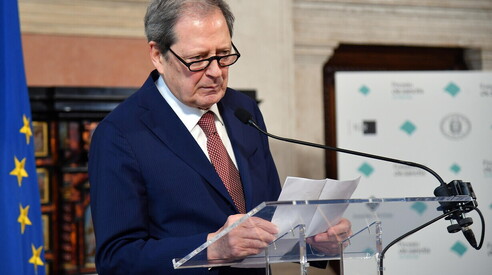If the Father were only the "necessary evil", not many things would be explained.


Handle
in literature
Giorgio Ficara's book, "The Father on His Shoulders", is a lyrical and discontinuous investigation into the paternal figure in literature, between absences, silences and fragility, which spans centuries and authors without ever truly building a thesis, leaving the Father with a capital F in the shadows.
On the same topic:
Il padre sulle spalle (The Father on His Shoulders) is the title chosen by Giorgio Ficara for his most recent work (Einaudi, CXCVIII - 10 pp., 17 euros). The subtitle, "Weakness of Patriarchy in Literature," strikes me as a clever ploy by Ostrich to throw in "patriarchy," the magic word that's back in the spotlight. In truth, reading Ficara's book, it's hard to pinpoint what this "weak patriarchy" actually consists of. Indeed, it's hard to discern a true thesis, since Ficara is more than an essayist: he suggests, he comments, he zigzags between authors and eras, he begins with Virgil and seems to move forward, but ultimately returns to the Bible; he moves from one literature to another, then suddenly departs from the texts to dedicate an entire section to the personal experiences of several poets grappling with their biological fathers; finally, he concludes with Rahner and Simone Weil, who would be difficult to include in a literary canon.
In short, Ficara doesn't construct a critical essay: it's rather a lyrical discourse, a dialogue between the professor and the Republic of Letters: an investigation into the father, and perhaps even a cry for help. Indeed, in almost all the cases he considers, the father figure stands out by default: in his absence, his silence, his impotence, or his sudden violence. There are some exceptions: Anchises, who constantly points the way to Aeneas (yet this constant memory is felt as a burden weighing on his son's shoulders, hence the book's title); Monaldo Leopardi, a sweet and gentle man, as his letters testify (yet also inept and incapable of grasping the boundaries of Giacomo's soul); Carlo Sbarbaro, the father with a "child's heart" (as Camillo described him in "the most beautiful poem about the father of our literature"), who nevertheless finds his best side in his "childhood," and is therefore not fully adult. Even in positive exceptions, therefore, there's always a "yet." So be it: we are human, after all, steeped in limitations and absolutes. But one might ask: is that all there is to it? For Dante, Ficara reminds us of Ser Brunetto: fine. But where is Virgil? Where is the father (not just spiritual) who knows where to look, who himself carries his son on his shoulders to the point of sacrifice?
As for Renzo Tramaglino, Ficara recalls that he has no father, and paradoxically, precisely for this reason, he is considered an "exemplary son," a "middle-class hero." But where has Fra Cristoforo gone, the father (and friend) par excellence in that great novel, who cares for the orphans and intervenes as best he can between them and the violence of history? Above all, why does Ficara recall (cannot help but recall) that for the evangelist John, God the Father is the Word, but then emphasizes only the silence of this God? That Word became incarnate: believe it or not, it is that incarnate Word (Christ) that we must listen to if we want to listen to God: otherwise, we are left with only the cumbersome silence of our hearts. Ficara has written a fine book, but he leaves out an important part. Because if the Father were only the "necessary evil" Joyce speaks of, not many things would be explained, starting with the West.
More on these topics:
ilmanifesto




